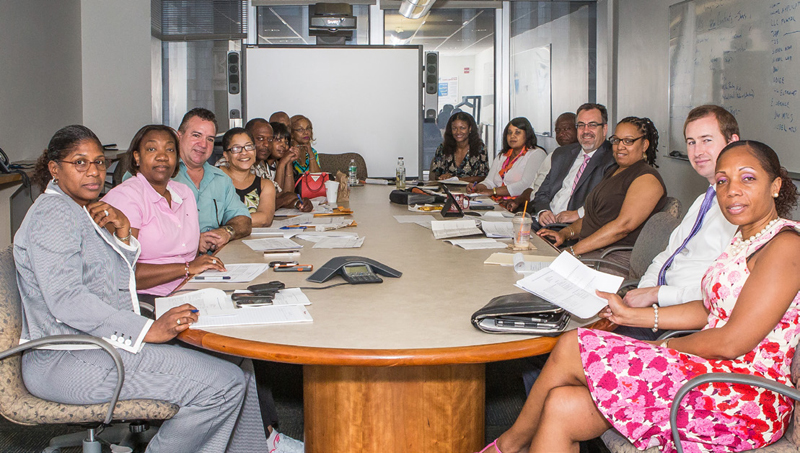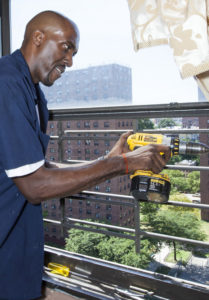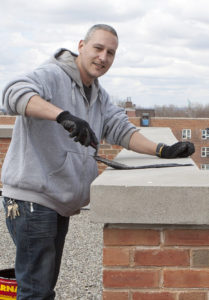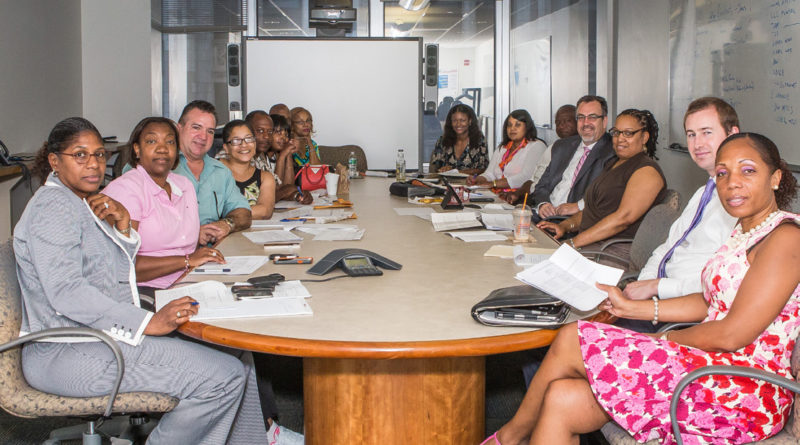GM Kelly Announces ‘Fix-It-Forward’ Initiative

On July 12, General Manager Michael Kelly marked 100 days on the job by announcing “Fix-It-Forward,” a major initiative to overhaul maintenance and repair operations and advance the NextGeneration NYCHA goal of operating as an efficient and effective landlord. Fix-It-Forward is in line with the Authority’s 10-year strategic plan to focus on its core business as a landlord, and offers common-sense fixes to key parts of NYCHA’s repair process to decrease response times and increase the customer satisfaction of residents.
Solutions intend to reform each stage of the repairs process—from enhanced customer service at the front end of a repair request, to the execution of repairs at the back end of a request.
“We know what our residents and public officials know—meaningful change at NYCHA starts with the most basic and fundamental responsibility we have as a landlord: maintenance and repairs,” Chair and CEO Shola Olatoye said. “After hearing from residents and staff about their frustrations and challenges, we took a hard look at our operating procedures. Fix-It-Forward, which enables us to execute NextGen through comprehensive initiatives, is their good feedback put into an action plan.”
“Despite progress, NYCHA’s track record on maintenance and repairs has been poor—period,” GM Kelly said. “Inadequate funding, aging buildings and cumbersome procedures have failed our residents who are forced to live in substandard conditions, and handicapped our hardworking maintenance workers, skilled trades men and women, and caretakers, who work every day to improve the quality of life for our residents. Without the resources and improved operating procedures to set NYCHA up for success, we cannot move the needle on maintenance and repairs and become the landlord our residents deserve.”
The meaningful changes included in Fix-It-Forward are intended to increase efficiency, provide a more timely sequencing of work, decrease wait times and most importantly, enhance customer service. Operation strategies are being piloted in several test developments and best practices will be assembled to implement authority-wide.

In response to resident concerns and in-the-field feedback, Fix-It-Forward identifies and provides solutions for the following problems:
Problem: Repairs take too long.
Solution: Optimal Property Management Operating Model (OPMOM)
As outlined in NextGen NYCHA, OPMOM is structured to empower local property managers at test developments to build their own budgets and determine staffing needs. The Authority projects that localization of management will lead to a reduction in repair time for basic maintenance to seven days. The OPMOM pilot launched in January at 18 developments, impacting 19,993 apartments.
Problem: Wait times between individual repairs on a single project take too long; multiple requests have to be made for repairs.
Solution: Real-Time Dispatching and myNYCHA App
Repairs will be tracked in real-time through dispatch communications, instead of paper work slips. The myNYCHA app will enable residents to create, submit, view, schedule/ reschedule and update inspections and maintenance service requests 24 hours a day, seven days a week.

Problem: Complex repair projects have unnecessary delays.
Solution: One Call
Complex repair projects typically require multiple components (for example, plumbing, carpentry, plastering, and painting) and require an individual work order to be opened for each part of the job, since each task requires a specialized trade and skill. The One Call initiative will allow residents and property managers to schedule all necessary components of a repair project with ‘one call.’
Problem: Minor repairs should not take as long as they do.
Solution: Real-Time Repairs
Simple repairs, such as smoke detectors, window guards, and minor plumbing repairs, and more complex repairs requiring skilled trades or vendors will be scheduled with the residents in real-time.
Problem: Mold continues to be an issue.
Solution: Capital Repairs & Revised Procedures
NYCHA has systematically changed how mold is handled, with a greater emphasis on determining the root cause which leads to mold, instead of superficial repairs that don’t address the underlying problem.
In collaboration with the New York City Department of Mental Health & Hygiene, NYCHA engaged environmental scientists from Rutgers University and Hunter College to help design new training programs. NYCHA has trained more than 350 supervisors in mold remediation. Supervisors have trained staff in the field to improve staff competency on how to address the root cause.
Problem: Perception that data and metrics on work orders aren’t real.
Solution: Enhanced Performance Measures
NYCHA is working to reorient performance-based measures to the total time to complete an entire repair, or service time. NYCHA will also communicate performance results by posting the OPMOM balanced scorecard that tracks metrics and performance at a property in the key areas of operations, including maintenance and emergency service levels, budget, customer service and resident satisfaction.
“I’m no stranger to criticizing NYCHA,” said Aixa Torres, Resident Association President at Smith Houses. “But, for the first time since I can’t remember when, NYCHA is giving us possible solutions to the problems with maintenance and repairs instead of more excuses. This is a different NYCHA than it was two years ago and in another two years, I hope it’s even more different and we see more positive changes.”







